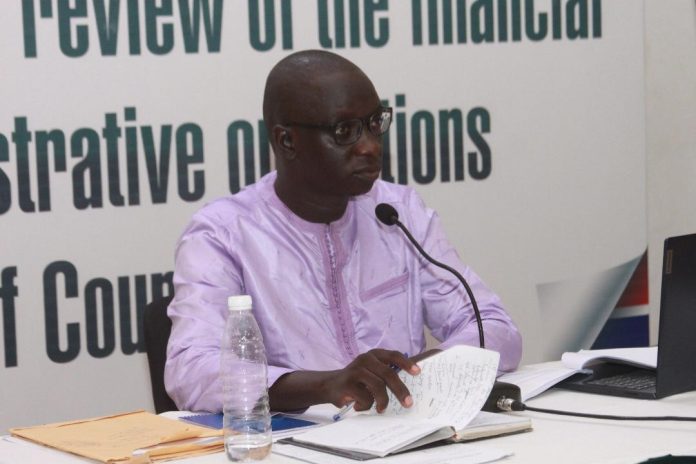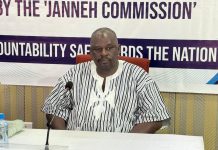By Yankuba Jallow
In a lengthy and sometimes tense session before the Local Government Commission of Inquiry, former Brikama Area Council Chairman Sheriffo Sonko and former Chief Executive Officer Modou Jonga faced probing questions over irregularities in council auctions and discrepancies in financial reporting during their tenure.
The two men, who appeared jointly before the commission, were questioned by Lead Counsel Patrick Gomez on a wide range of issues, including the unexplained disposal of a septic tank, declining car park revenues, and the auction of vehicles with questionable valuation records. The commission is investigating the financial and administrative operations of local councils from May 2018 to January 2023 to promote transparency and accountability.
The inquiry began with questions surrounding a septic tank listed for auction in Kancho. Counsel Gomez asked Mr. Jonga whether he recalled the tank being part of the disposal process. “No, I don’t recall this,” Jonga said. “That’s news to me.”
Yet records indicated that the septic tank had been identified for auction. When asked for clarification, Mr. Jonga responded, “All right, I will get the information.”
The session then turned to council revenues from car park fees, which showed a drop from over 1.9 million dalasis in 2019 to 1.87 million dalasis in 2020, and surprisingly zero in 2021. Jonga was asked to explain. “Well, we are not the collecting agency, so I might not be in the right position to explain the drop,” he said.
Pressed further on the accuracy of these financial statements, Mr. Jonga conceded that he would need to confirm the records. “I would like to confirm this with the finance team,” he said.
Lead Counsel Gomez pointed out discrepancies between the financial reports and the figures in the auditor’s statement. “Would it be a correct, a fair statement to say that the financial statements were misstated?” he asked. “I would like to confirm, confirm with the finance team,” Jonga replied.
The questioning then focused on the 2020 vehicle auction. According to a report addressed to Mr. Jonga by the council’s finance manager, the expected revenue was D1,229,600. However, only D1,126,100 was initially received, leaving a balance of D103,500 as of January 28, 2020. A later payment was received, but the balance still stood at D82,500 by the end of March 2020.
Mr. Jonga attempted to clarify the discrepancy. “The estimated, the amount that was to be generated from the auction sale in 2020 was D545,000. But in actual fact, we ended up generating D1.2 million,” he said. Counsel Gomez corrected him, referencing the finance report that indicated the expected figure was already D1.2 million.
The inquiry also examined whether vehicles sold at auction were properly evaluated and in roadworthy condition. Mr. Jonga acknowledged that he relied on the advice of an internal committee. “It was as a result of the outcome of the work of the committee that we were advised to auction some of the vehicles and the scrap materials,” he said.
However, the commission expressed concern that no comprehensive technical reports were presented to support the auction decisions. When asked whether every vehicle was assessed for its condition, Mr. Jonga said, “I can agree that the assessment is inadequate, but we had the assessment.”
According to a report submitted by evaluator Matar Sisi, the total value of auctioned items was listed at D545,000. But the report also revealed that “most of the valuable parts were withdrawn from the vehicle, including engine, engine parts, wheel tires, etc. Most of what is left on most of them is scrap and empty body.”
Mr. Jonga confirmed this practice. “You have the same vehicle, the parts are compatible… so we have a similar vehicle. Can we take this part?” he said, adding, “Most often, in fact, there will be no consultation.”
Lead Counsel Gomez pressed him further: “Now we are to say that BAC 3 should have an engine, BAC 4 must have an engine… If they do not have an engine, then the CEO must explain where the engine is.”
Mr. Jonga maintained that all but one vehicle had engines at the time of auction. “Those vehicles are all with engine except one, like I said, which is a septic tank,” he said.
When questioned about BAC 3, a station wagon sold for D10,000, Mr. Jonga admitted he could not recall its specific issue. “I am not a mechanic to be able to say exactly what was the problem. I know it was grounded.”
He was also asked about BAC 4, valued at D40,000. “I cannot recall exactly what was wrong with BAC 4,” he said. “But I know at the time of the auctions, all these vehicles that were put up for auction are not on the road.”
Counsel Gomez challenged this logic. “A vehicle can be off the road and still be a very good vehicle,” he said. Mr. Jonga agreed. “Yes, I agree,” he responded.
Asked whether he was given proper technical advice under the Public Procurement Act, Mr. Jonga said, “Well, I can report that the vehicles that we put up for auction were not roadworthy.”
Yet he admitted he could not provide technical evidence. “I cannot recall the specific problem… I honestly would not be able to provide you with that.”
Counsel Gomez pointed out the lack of detailed reports from the evaluators. “What we have here from the RCC is everything about the vehicles, but short of the state of each of the vehicles that you are to auction.”
Mr. Jonga acknowledged the shortcoming. “It should have been more detailed, more comprehensive,” he said.
Despite that, he insisted the process followed the rules. “Yes, we followed the GPPA regulation,” he said.
However, the commission questioned how that could be the case in the absence of full technical reports. “Because when these vehicles were subjected to auction, you could not lay your hands on a document assessing the state of these vehicles,” Gomez stated.
“We had the assessment,” Mr. Jonga replied, “I can agree that the assessment is inadequate.”
As the hearing ended, the commission requested that the witnesses return with supporting documents and breakdowns of car park fees, auction revenues, and asset conditions. The inquiry into Brikama Area Council’s activities continues as the commission seeks answers into missing public funds, misstatements in official accounts, and apparent irregularities in public asset disposal.



















